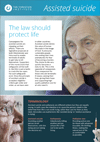A leading advocate for disability rights is spearheading a campaign urging MPs not to relax laws on assisted suicide.
Baroness Campbell of Surbiton, who was born with the wasting disease spinal muscular atrophy, is calling on politicians to sign a charter declaring that disabled and terminally ill people should receive the same legal protection and support as everyone else.
The charter, part of Not Dead Yet UK’s Resistance campaign, also calls on MPs to resist any new attempts to weaken the law on euthanasia or assisted suicide.
Bleak
Lady Campbell warned: “We face a bleak situation if calls for assisted suicide to be lawful are renewed whilst vital services are being withdrawn or denied.”
She points out that disabled people need help and support to live, not to die.
She said: “We cannot allow others to speak for us – especially those who seek to offer us the choice of a premature death: it is not a choice, it is to abandon us.”
Prosecution
Lady Campbell is a former chairman of the Disability Rights Commission and head of the all-party disability group.
Her comments follow two attempts to change the law in the House of Lords in recent years and an ongoing Bill in Scotland.
The Director of Public Prosecutions for England and Wales, Keir Starmer QC, was also forced to issue guidance earlier this year, following a legal case supported by pro-euthanasia campaigners.
He announced that prosecutions for assisted suicide may be less likely if the suspect was wholly “motivated by compassion”.
Guidelines
Mr Starmer reminded people that assisted suicide remains illegal. The guidelines list the factors to be considered when deciding whether a prosecution is “in the public interest”.
Dr Peter Saunders, of the pro-life group Care Not Killing, criticised the guidelines: “Anyone who takes part in an assisted suicide is going to claim they were acting out of compassion. The only witness who really knows will be dead.”
Concern
Last month the Crown Prosecution Service (CPS) revealed that a man who helped his wife suffocate herself would not be prosecuted for assisting her suicide.
The decision increased concern among pro-life groups who fear that assisted suicide is being legalised by the back door.
Mike Judge, Head of Communications at The Christian Institute, cautioned: “I am not questioning the honesty of this family but the CPS is in this case relying on their evidence that she had a settled wish to die.
Respect
“It is also the case that people who appear to have a settled wish to die can change their minds.
“We are becoming a society where the assessment of your quality of life hinges on what you can do, rather than respect for life itself.”
A spokesman for Care Not Killing alliance, said: “We have concerns that the compassion test laid down by the DPP could be used as a backdoor legalisation of euthanasia and we will be looking at every case very closely.”
Vulnerable
During a debate on assisted suicide in the House of Lords last July, Baroness Campbell made a moving speech appealing to Peers to reject attempts to make it legal to help someone travel overseas to commit suicide.
Born with the wasting disease spinal muscular atrophy, she told of how three years ago doctors had convinced her that her life was at an end and that it was “time for me to go on my way”.
She warned that many vulnerable patients would face similar pressure if the law was weakened.
Dignity
She warned the House: “Legalising premature death as a treatment option plants a seed of doubt about one’s right to demand help to live with dignity and undermines the state’s responsibility to ensure that all citizens can live with dignity.”
Lady Campbell commented on the amendment being debated at the time and said if it were to succeed, “it would place a new and invidious pressure on disabled and terminally ill people who think that they are close to the end of their lives”.
Anxious
She added:”Some will consider death as preferable to fighting for support to live with dignity. It will be the cheapest, quickest and simplest option.
“Think of older people who are anxious not to cause their families any distress.”
Peers voted 194 to 141 to reject the amendment.

